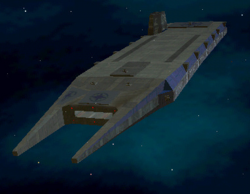TCS Mount St. Helens: Difference between revisions
No edit summary |
mNo edit summary |
||
| Line 25: | Line 25: | ||
The ''TCS Mount St. Helens'' was eventually returned to the Terran Confederation after the Border Worlds Conflict was resolved, where it was repaired, completed, and finally commissioned. The ''Mount St. Helens'' would not see any major fleet actions until 2681, when the [[Nephilim War]] broke out along the Kilrathi frontier. It served Humanity proudly through to its destruction by the [[Nephilim]] shortly after the second Nephilim wormhole in Proxima was discovered. | The ''TCS Mount St. Helens'' was eventually returned to the Terran Confederation after the Border Worlds Conflict was resolved, where it was repaired, completed, and finally commissioned. The ''Mount St. Helens'' would not see any major fleet actions until 2681, when the [[Nephilim War]] broke out along the Kilrathi frontier. It served Humanity proudly through to its destruction by the [[Nephilim]] shortly after the second Nephilim wormhole in Proxima was discovered. | ||
[[category:Confederation Capital Ships by Name]] | [[category:Confederation Capital Ships by Name]][[Category:Confederation ships that served in the Border Worlds Conflict]] | ||
Revision as of 03:46, 15 August 2010
| TCS Mount St. Helens (CV-71) | |
|---|---|

| |
| Type | Vesuvius-Class Heavy Carrier |
| Manufacturer | |
| Primary user | Terran Confederation |
The TCS Mount St. Helens was the second Vesuvius-Class Heavy Carrier to be commissioned by the Terran Confederation.
Construction
The TCS Mount St. Helens was a massive heavy carrier and the sister ship of the TCS Vesuvius. Like its sister ship, it was designed as a heavily-advanced, self-sufficient carrier that could hold its ground without the need for escorts on the front lines. It was one of the largest vessels in the Confederation Space Navy at the time of its construction. It was constructed at the shipyards of the Orion Station orbiting Mars in the Sol System, where Admiral Geoffrey Tolwyn oversaw its progress alongside the construction of Vesuvius.
Border Worlds Conflict
By 2673, the TCS Mount St. Helens was approaching its final stages of construction. Its sister ship the Vesuvius was the first to be commissioned and was immediately pressed into active service. The Mount St. Helens remained in drydock as it finished construction.
During the final days of the Border Worlds Conflict, Captain William Eisen, who had defected to the Union of Border Worlds, received word that Colonel Christopher Blair on the BWS Intrepid was pursuing Tolwyn and the Vesuvius in order to stop him from securing a war declaration from the Confederation government on Earth. Eisen and his allies within the Confederation commandeered the Mount St. Helens from Orion Station in order to assist the Intrepid. Many of the weapons and shield systems on the Mount St. Helens were not yet fully operational, making her vastly inferior to the completed Vesuvius. Captain Eisen was aware of the situation, but chose to continue with the interception.
The TCS Mount St. Helens jumped into the Talos System and attacked the Vesuvius as it was engaged with Intrepid, allowing the Border Worlds vessel to escape to the jump point. Eisen and Blair pursued the Vesuvius to Sol, and by this point had badly damaged Tolwyn's flagship. The Mount St. Helens was then forced to retreat after sustaining critical damage, leaving the Intrepid to pursue Tolwyn alone. Despite this setback, the actions of the Mount St. Helens proved instrumental in the eventual destruction of the Vesuvius and the aversion of a Confederation war declaration against the Border Worlds.
Terran Service
The TCS Mount St. Helens was eventually returned to the Terran Confederation after the Border Worlds Conflict was resolved, where it was repaired, completed, and finally commissioned. The Mount St. Helens would not see any major fleet actions until 2681, when the Nephilim War broke out along the Kilrathi frontier. It served Humanity proudly through to its destruction by the Nephilim shortly after the second Nephilim wormhole in Proxima was discovered.